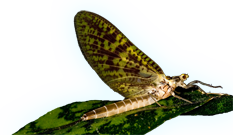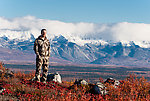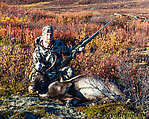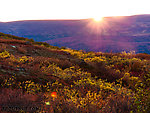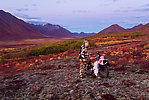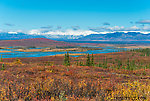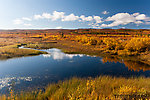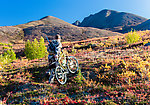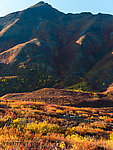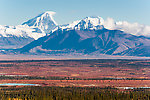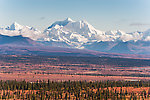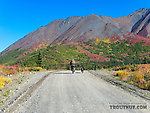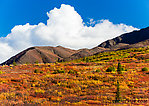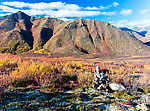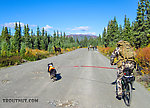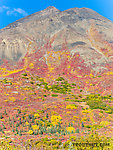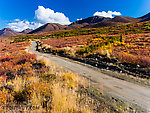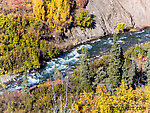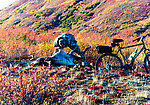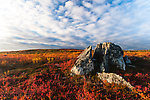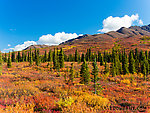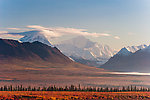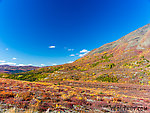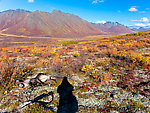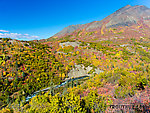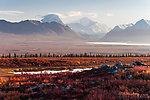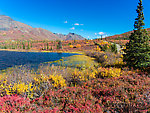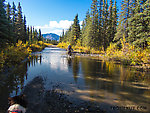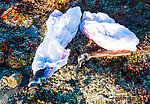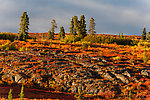Blog & Latest Updates
Fly Fishing Articles
Insects by Common Name

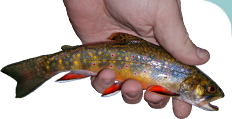
> > Sightseeing and a casual caribou hunt off the Denali Highway
Sightseeing and a casual caribou hunt off the Denali Highway
Lena and I took a quick trip down the Denali Highway this past weekend. Fall colors were peaking and the air was exceptionally clear, with not only sunny skies but great air clarity to reveal the details of the distant snow-capped peaks. We drove in from the west (Cantwell) side Friday night and camped near mile 100, overlooking the Monahan Flats.
I woke with the sunrise Saturday morning and stepped out of our car to take some pictures. The warm morning lighting electrifies the brightly colored leaves of dwarf birch, willow, and blueberry that blanket the mid-altitude tundra. We had hot breakfast with fresh-picked blueberries, rearranged the car from "camp" to "driving" mode, and drove east, watching for caribou in the high ground along the way.
I hunted hard for caribou with my dad a couple weeks earlier and came up empty-handed. Interior Alaska had a very strange year without a real spring. Winter stretched into late May and summer arrived a few days later. Our heavy snow pack melted fast, swelling icy rivers and preventing caribou from moving to and from their traditional calving grounds safely. Ripple effects from that strange season perturbed the herd's movements for the rest of the year. This is, at least, the most convincing story going around to explain why the Nelchina caribou herd was uncharacteristically hiding away in various inaccessible corners of the high country this fall, rarely to be seen within reach of the road system.
The Department of Fish and Game regularly updates a hotline with information on caribou movements and regulations, and the prognosis for this weekend wasn't much better than when I hunted two weeks ago. Nevertheless, I convinced my wife that our sightseeing/biking/hiking plans might as well involve trying to find a bull (i.e. legal to shoot) caribou. In the morning, that meant driving slowly through the high country west of the Susitna, stopping often to scan the northern foothills of the Talkeetna Mountains with binoculars. We found nothing.
East of the Susitna, the Denali Highway runs along the mountains of the Clearwater Controlled Use Area, which forbids motorized access for hunting except via the Denali Highway itself. We donned backpacks for a 7-mile mountain bike ride up Valdez Creek Road toward an area that had attracted part of the herd according to the Fish & Game hotline. A couple miles in, I realized we'd started too late and were moving too slowly to reach our destination with time left to hunt. We paused to enjoy the scenery and then rode back to the car. With our dog Taiga now well-exercised, we left her in the car at 2:00 pm and started the next bike ride up Windy Creek Road a mile to the east. In Windy Creek, I knew we would enter potential caribou habitat much closer to the main road, although the absence of the main herd still made success unlikely.
We took our time on the mostly uphill ride into Windy Creek's breathtaking tundra valley, stopping at overlooks to admire the colorful canyon and the inviting, grayling-laden whitewater at its base. By 3:45 we were about three miles in, and I spotted the telltale dark body and white rump of a caribou half a mile away, munching willow leaves and wandering around the north rim of the canyon across the creek from us. I could barely see antlers, so I knew it was probably just a cow. However, the body size and shape seemed bull-like in some vague way, and when I finally glimpsed of the antlers clearly, they had curvature more characteristic of a small bull than a cow.
I've learned not to just take off after a caribou when I spot one, because by the time I get to where it was, it will have aimlessly, leisurely meandered a mile away. The hunt is about anticipating where they'll go and intercepting them. We simply watched this one for fifteen minutes and it was staying in a small area across the creek. Thinking there might be a fifty-fifty chance this animal was a bull, I stashed my bike and set off through the tundra in its direction. I only went thirty yards before the animal spooked, but not at me. It would run a little bit to the east, stop and look back west and sniff, run a little more, sniff a little more, etc. Caribou are paranoid, and this one might have been spooked by other hunters (we knew a few were in the valley somewhere), wolves (which the other hunters saw earlier in the day), or its own shadow. It disappeared down into the canyon.
I last saw it moving to the southeast, so I projected that it might cross the river, and then it might come cross the road on our side. So I road fast half a mile to the east to where I expected the animal to appear. Naturally, the caribou instead went directly for the place I'd just been. I glimpsed it moving through the bushes back that way and rode a third of a mile back to the west. I found it again, already across the road and moving up a ridge to the south. It was slowly feeding and ambling along, very relaxed. This is about as slowly as a caribou ever moves, which is still as fast as a hunter possibly can move with any semblance of stealth.
The wind favored my approach, and a shallow gully packed with tall bushes concealed me from the caribou. It was about 200 yards away now, but I still didn't know if it was a bull, and I didn't have a great shooting rest. One shot opportunity passed by while I squinted through binoculars at the animal's nether regions, desperate for a positive ID. It disappeared behind the bushes, and I hurried uphill to the next gap in the trees where I might see it. Again it appeared, and again I squinted, ever more convinced it was a bull but not quite certain enough.
Ten minutes and a quarter mile into this uphill pursuit, I was 133 yards from the caribou and 99.99% sure it was a bull. Lacking a good shooting rest, I braced my elbow on my knee, centered the crosshairs on the lungs, and pulled the trigger on my Tikka .300 WSM at 4:37 pm. The caribou reared back and teetered around on three legs--I'd hit low (as I customarily do on my first shot). I fired again, missing, I think. The third shot in less than five seconds clipped the top of the heart and dropped the caribou in its tracks.
As I took my first steps toward the downed animal, a dozen willow ptarmigan flushed from ten feet in front of me. I spent (Spent: The wing position of many aquatic insects when they fall on the water after mating. The wings of both sides lay flat on the water. The word may be used to describe insects with their wings in that position, as well as the position itself.) hours last week looking for those darn things, and here they made a startling appearance the instant I'd downed larger quarry. Clever birds.
Despite my previous certainty, I was nevertheless relieved to walk up to my caribou and verify that it was a bull, and therefore legal. Now the work began. Since I hadn't expected to actually get anything, we'd left the backpacks at the car, and instead I brought my mountain bike up from the road across the tundra to the kill site. At about 5:45 I started quartering the animal and bagging up all the other meat, and by 8:30 I was finished and had everything loaded onto my bike (with no room for myself -- I would walk it down the hill). We hung the heaviest meat bags (hind quarters & burger scraps) in a roadside alder thicket, hoping the wolves wouldn't find them that night. Other hunters were camped just up the road, and we told them about our meat and the hearsay of wolves and borrowed a water filter for a much-needed drink (a supply I will never mistakenly forget at the car again).
It was an easy 20-minute ride downhill to the car and camp. My Zebralight H51W headlamp, a favorite piece of gear, burned through most of a whole AA battery on that short ride, projecting an impressive spotlight beam to guide both of us on bikes down the rocky mountain road in the dark. The moonlit descent was a fitting end to a beautiful day.
I woke with the sunrise Saturday morning and stepped out of our car to take some pictures. The warm morning lighting electrifies the brightly colored leaves of dwarf birch, willow, and blueberry that blanket the mid-altitude tundra. We had hot breakfast with fresh-picked blueberries, rearranged the car from "camp" to "driving" mode, and drove east, watching for caribou in the high ground along the way.
I hunted hard for caribou with my dad a couple weeks earlier and came up empty-handed. Interior Alaska had a very strange year without a real spring. Winter stretched into late May and summer arrived a few days later. Our heavy snow pack melted fast, swelling icy rivers and preventing caribou from moving to and from their traditional calving grounds safely. Ripple effects from that strange season perturbed the herd's movements for the rest of the year. This is, at least, the most convincing story going around to explain why the Nelchina caribou herd was uncharacteristically hiding away in various inaccessible corners of the high country this fall, rarely to be seen within reach of the road system.
The Department of Fish and Game regularly updates a hotline with information on caribou movements and regulations, and the prognosis for this weekend wasn't much better than when I hunted two weeks ago. Nevertheless, I convinced my wife that our sightseeing/biking/hiking plans might as well involve trying to find a bull (i.e. legal to shoot) caribou. In the morning, that meant driving slowly through the high country west of the Susitna, stopping often to scan the northern foothills of the Talkeetna Mountains with binoculars. We found nothing.
East of the Susitna, the Denali Highway runs along the mountains of the Clearwater Controlled Use Area, which forbids motorized access for hunting except via the Denali Highway itself. We donned backpacks for a 7-mile mountain bike ride up Valdez Creek Road toward an area that had attracted part of the herd according to the Fish & Game hotline. A couple miles in, I realized we'd started too late and were moving too slowly to reach our destination with time left to hunt. We paused to enjoy the scenery and then rode back to the car. With our dog Taiga now well-exercised, we left her in the car at 2:00 pm and started the next bike ride up Windy Creek Road a mile to the east. In Windy Creek, I knew we would enter potential caribou habitat much closer to the main road, although the absence of the main herd still made success unlikely.
We took our time on the mostly uphill ride into Windy Creek's breathtaking tundra valley, stopping at overlooks to admire the colorful canyon and the inviting, grayling-laden whitewater at its base. By 3:45 we were about three miles in, and I spotted the telltale dark body and white rump of a caribou half a mile away, munching willow leaves and wandering around the north rim of the canyon across the creek from us. I could barely see antlers, so I knew it was probably just a cow. However, the body size and shape seemed bull-like in some vague way, and when I finally glimpsed of the antlers clearly, they had curvature more characteristic of a small bull than a cow.
I've learned not to just take off after a caribou when I spot one, because by the time I get to where it was, it will have aimlessly, leisurely meandered a mile away. The hunt is about anticipating where they'll go and intercepting them. We simply watched this one for fifteen minutes and it was staying in a small area across the creek. Thinking there might be a fifty-fifty chance this animal was a bull, I stashed my bike and set off through the tundra in its direction. I only went thirty yards before the animal spooked, but not at me. It would run a little bit to the east, stop and look back west and sniff, run a little more, sniff a little more, etc. Caribou are paranoid, and this one might have been spooked by other hunters (we knew a few were in the valley somewhere), wolves (which the other hunters saw earlier in the day), or its own shadow. It disappeared down into the canyon.
I last saw it moving to the southeast, so I projected that it might cross the river, and then it might come cross the road on our side. So I road fast half a mile to the east to where I expected the animal to appear. Naturally, the caribou instead went directly for the place I'd just been. I glimpsed it moving through the bushes back that way and rode a third of a mile back to the west. I found it again, already across the road and moving up a ridge to the south. It was slowly feeding and ambling along, very relaxed. This is about as slowly as a caribou ever moves, which is still as fast as a hunter possibly can move with any semblance of stealth.
The wind favored my approach, and a shallow gully packed with tall bushes concealed me from the caribou. It was about 200 yards away now, but I still didn't know if it was a bull, and I didn't have a great shooting rest. One shot opportunity passed by while I squinted through binoculars at the animal's nether regions, desperate for a positive ID. It disappeared behind the bushes, and I hurried uphill to the next gap in the trees where I might see it. Again it appeared, and again I squinted, ever more convinced it was a bull but not quite certain enough.
Ten minutes and a quarter mile into this uphill pursuit, I was 133 yards from the caribou and 99.99% sure it was a bull. Lacking a good shooting rest, I braced my elbow on my knee, centered the crosshairs on the lungs, and pulled the trigger on my Tikka .300 WSM at 4:37 pm. The caribou reared back and teetered around on three legs--I'd hit low (as I customarily do on my first shot). I fired again, missing, I think. The third shot in less than five seconds clipped the top of the heart and dropped the caribou in its tracks.
As I took my first steps toward the downed animal, a dozen willow ptarmigan flushed from ten feet in front of me. I spent (Spent: The wing position of many aquatic insects when they fall on the water after mating. The wings of both sides lay flat on the water. The word may be used to describe insects with their wings in that position, as well as the position itself.) hours last week looking for those darn things, and here they made a startling appearance the instant I'd downed larger quarry. Clever birds.
Despite my previous certainty, I was nevertheless relieved to walk up to my caribou and verify that it was a bull, and therefore legal. Now the work began. Since I hadn't expected to actually get anything, we'd left the backpacks at the car, and instead I brought my mountain bike up from the road across the tundra to the kill site. At about 5:45 I started quartering the animal and bagging up all the other meat, and by 8:30 I was finished and had everything loaded onto my bike (with no room for myself -- I would walk it down the hill). We hung the heaviest meat bags (hind quarters & burger scraps) in a roadside alder thicket, hoping the wolves wouldn't find them that night. Other hunters were camped just up the road, and we told them about our meat and the hearsay of wolves and borrowed a water filter for a much-needed drink (a supply I will never mistakenly forget at the car again).
It was an easy 20-minute ride downhill to the car and camp. My Zebralight H51W headlamp, a favorite piece of gear, burned through most of a whole AA battery on that short ride, projecting an impressive spotlight beam to guide both of us on bikes down the rocky mountain road in the dark. The moonlit descent was a fitting end to a beautiful day.
Photos by Troutnut from Denali Highway, Clearwater Mountains, the Susitna River, and Windy Creek in Alaska
Comments / replies
| Crepuscular | September 20th, 2013, 8:30 am | |
| Boiling Springs, PA Posts: 923 | Wow.Thaks for shareing this Jason! The place is beautiful. I especially like the photos of the mountains and the one of the rock outcropping (second one from the top). Congratulations on the Caribou. I'd love to get my dogs up there and try and find some birds! | |
| Feathers5 | September 20th, 2013, 9:43 am | |
| Posts: 287 | Again, Jason, awesome pictorial. I just love seeing these photos. | |
| Jmd123 | September 20th, 2013, 4:29 pm | |
| Oscoda, MI Posts: 2611 | Jason, you are "living large"! BTW, any fishies in those waters in your photos? Again, thanks for sharing, just unbelievable. Glad you got you a caribou! Enjoy that healthy wild game. Recipes? What exactly will you do with that meat? Jonathon | |
| No matter how big the one you just caught is, there's always a bigger one out there somewhere... | ||
| Troutnut | September 20th, 2013, 4:35 pm | |
Administrator Bellevue, WAPosts: 2737 | Windy Creek is well-known for good grayling fishing, although that's true of almost every clear creek of its size in these mountains. I haven't had a chance to try for them yet but it might make a fun summer trip. From this caribou, I put about 45 steak dinners and 5 rib dinners in the freezer, and dropped off 61 pounds of loose meat to be processed into smoked hot dogs, summer sausage, and pepper sticks. I should also get enough ground meat back to make a 10-pound batch of ground caribou jerky (secret family recipe) and about 20 burger patties. I still have a bit of ground meat and sausage left in the freezer from last year's caribou, and I have breakfast sausage, italian sausage, and chorizo from my spring black bear. I'll be eating well this winter! This is my favorite elaborate recipe for tenderloins/backstraps and steaks: http://foodwishes.blogspot.com/2012/04/beef-tenderloin-medallions-with.html If I don't feel like messing with that fancy recipe, I just sear them with some butter in a cast iron pan, apply a dry rub (Grill Mates "Montreal Steak" seasoning) after searing so the spices aren't burnt, and then rest them under aluminum foil on a plate for a few minutes to finish cooking to a nice medium rare inside. And I've been using this one for the ribs: http://suite101.com/a/best-recipe-for-bbq-venison-ribs-a87352 | |
| Jason Neuswanger, Ph.D. Troutnut and salmonid ecologist | ||
| PaulRoberts | September 23rd, 2013, 7:37 pm | |
| Colorado Posts: 1776 | Awesome country, wonderful photos, and great story. Thanks for the details. And congrats on your bull. Nothing like hard-earned quality meat in the freezer for the winter. | |
Quick Reply
You have to be logged in to post on the forum. It's this easy:
Related Discussions
| Title | Replies | Last Reply |
| Re: Finds at Craft Stores In Fly Tying by Oldredbarn | 14 | Dec 17, 2012 by Martinlf |
| Re: Fall In General Discussion by Softhackle | 23 | Sep 28, 2007 by Gene |
| Re: best trout fly In General Discussion by Vinlflyfish | 23 | Jul 17, 2010 by Windknot79 |
| Re: My first caribou (and first bow kill of any kind) -- pictures (3 more) In the Photography Board by Troutnut | 2 | Aug 18, 2008 by Shawnny3 |
| Re: This is just WRONG In the Photography Board by Jmd123 | 1 | May 10, 2020 by Wbranch |
| Re: Ephemerellidae In the Identify This! Board by Crepuscular | 10 | Jun 10, 2013 by Oldredbarn |
| Re: New photography forum section In the Photography Board by Troutnut | 2 | Dec 3, 2006 by Troutnut |
| Re: Atigun float In by Sci | 1 | May 21, 2022 by Troutnut |
| Re: cutthroats in the east? In General Discussion by Brooklover | 9 | Apr 25, 2008 by Aaron7_8 |
| Re: Materials In Fly Tying by RedQuill27 | 11 | Nov 16, 2009 by RedQuill27 |
Troutnut.com is copyright © 2004-2024 Jason
Neuswanger (email Jason). See my FAQ for information about use of my images.
 privacy policy
privacy policy
